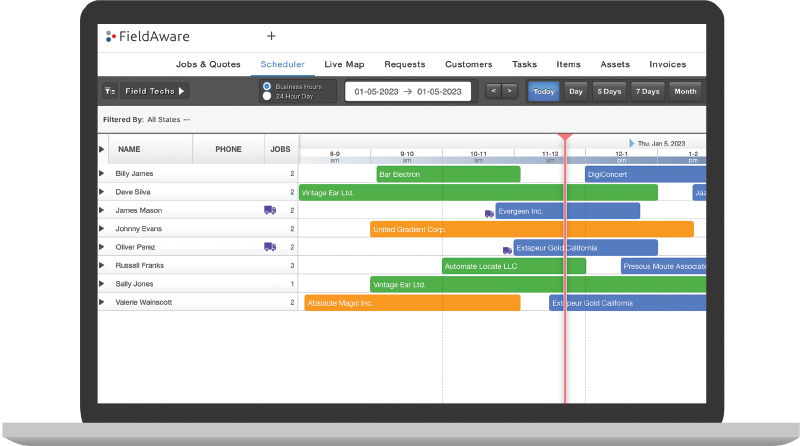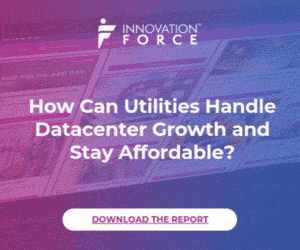For the Q1 issue, we feature an article by GPS Insight CEO Steve Mason, who explains the importance of environmental, social and governance standards in an organization, and how field service management solutions provide the tools to help tackle ESG initiatives.
It hasn’t been long since environmental, social and governance (ESG) standards were merely a public relations tactic, but this has changed immensely in recent years. Today, these standards are a symbol of organizational proficiency. As such, they are a vital part of a company’s long-term competitive achievements. Investors are well aware of this and are increasingly attracted to investing in companies that treat their employees fairly but operate ethically and make significant pledges toward sustainability. Not only have approximately 80% of investors stated that ESG considerations have a substantial influence on their investment decision-making, according to PwC, but about 50% have gone as far as to indicate that they would withdraw from investing in a company that did not take appropriate ESG actions.
The spotlight on ESG isn’t coming from investors alone. Everyone who is part of the ecosystem – from employees to regulators – are tuned in. More than 65% of Americans consider sustainability when making a purchase or choosing where to work. Because of this, companies everywhere are making swift moves to enhance their equity, diversity and governance, but, perhaps most importantly, reduce emissions to the greatest extent possible. In fact, investors are yearning to connect with companies and understand where they are in their ESG journey.
Suppose companies have no way of communicating through reporting and can therefore provide no quantifiable actions being made. When that is the case, investors will not hesitate to sell their investments and move on without looking behind.
Fleet participation
Organizations in many fields are going to extraordinary measures to find ways to reduce their carbon emissions. Fleets have historically been relied upon to reach customers and deploy vital assets. For this reason, field service organizations that utilize fleets are in a position in which they must modernize their critical operations to reach sustainability goals. Without a doubt, fleets keep life moving at a pace we’ve become accustomed to; we rely on them for many necessities and luxuries. Unfortunately, this means the fleets contribute to air pollution. About 27% of the total U.S. warming emissions get credit as coming from the transportation sector, according to the United States Environmental Protection Agency.
Leaders of organizations that rely heavily upon fleets to run successful businesses may look at the issue at hand and feel like there’s no way to effectively reduce emissions. On the contrary, with the appropriate field service management solution (FSM), any organization can take the reins and begin making huge strides toward helping themselves meet all ESG objectives, especially sustainability goals. For instance, doing away with just one on-site service visit each day can reduce the same amount of carbon as more than five acres of U.S. forests absorb every day. This is no small matter. FSM helps with this and more, ensuring organizations meet high ethical standards, lower emissions and reduce waste.
All of this is important, but it takes dedication of time, effort and resources on the part of field service teams. Investing in FSM is not just a move to reach sustainability goals – it can also increase a company’s efficiency while providing a sizeable return on investment (ROI).
Diving into the toolbox
An FSM has many aspects that can directly help a company reduce emissions and drive sustainability. Because in-person visits are standard in field service, it’s an important aspect. Take, for example, augmented reality. With FSM tools like this, organizations are arming themselves with essential means to tackle ESG initiatives, as it can quickly and efficiently resolve customer issues. Instead of sending a service technician miles away to a site, they can virtually connect with customers in minutes. This enables the service technicians to assess an issue swiftly, bring in any necessary experts virtually and work together to troubleshoot any problems.
Scheduling is such an essential part of field service work. Field service planners or schedulers typically know the customer territory and the capabilities of their technicians in great detail. Schedulers wear many hats, but because they are knowledgeable, this can create information silos. It also means they are an extremely active and busy cog in the organization’s machine. To successfully chart the course for an organization, the field service teams need time to plan and institute a schedule and establish roots with technicians.
Time, of course, is often the scarcest commodity. Placing so many essential tasks in the hands of one person can lead to delays. Too often, the dispatch center becomes the bottleneck to growing the field workforce and reducing productivity and opportunity for more business. Worse, if there are inefficiencies today, scaling up the operation means scaling up those inefficiencies later, too.
Unfortunately, all of this can amount to a balancing act that can result in schedulers needing more time to plot out work carefully. Lack of time means reacting rather than planning. This can also lead to mistakes, which is how techs end up with inefficient routes and unnecessary or excessive travel time.
FSM tools
With FSM tools like route organization and smart scheduling, predetermined stops can be created in a way that chooses the best distance, speed and highway preferences. An FSM scheduling tool allows service managers to assign work and route the right technicians to the right job at the precise time, smoothly and seamlessly. Considering scheduling and dispatching will help identify the correct technician for the job and allow the drivers to choose and take the shorter and more efficient route.
Additionally, once the dispatcher approves the job and route, techs are immediately alerted and can access all the job’s previous data. All this will save time and prevent unnecessary and excessive fuel burning while also keeping techs from having to make repeat visits.
Data collection
Not only do FSM tools help to eliminate the high frequency of visits, but they support far fewer physical work orders. With work order management, digitization and paperless office tools, documentation of jobs can be done swiftly and correctly. This one-touch data collection environment gives employees access to job information from anywhere.
But let’s say a technician meets a problem that requires an in-person visit. FSM capabilities, like mobile apps, field engineer communications and predictive analytics, will help them better handle the job. Not only does all of this contribute to improved sustainability, but it also makes for a work environment that is a more positive experience for the employee.

A GPS tracking solution tied to an FSM can also help monitor and analyze fleets' efficiency and reduce unnecessary idle times. An idling engine can increase engine wear and air pollutants. By reducing idle time through technology, companies can overcome wasting hundreds of gallons of fuel and reduce emissions. When an FSM combines all these technologies within one space, along with additional perks like artificial intelligence (AI), self-service technology and the use of 5G technology, it enables team members to effectively monitor all assets off-site while also giving customers access and tools to resolve issues successfully without in-person help needed.
Meeting goals
Many field service organizations are already reaping the benefits of utilizing an FSM. For instance, many company leaders have described 5G technologies and self-service technologies, as well as smart scheduling and route optimization, as very effective in helping them reach their sustainability goals. Furthermore, many field service organizations already utilizing augmented reality and remote assistance tools to lessen on-site visits and cost services agree that the tools have been effective in reaching sustainability goals. Evaluating this data suggests that most field service companies taking advantage of an FSM for sustainability has already reduced “truck trolls” by more than a quarter. This amounts to a significant reduction in fuel consumption, which results in cost savings and a worthy contribution to the environment.

Providing insight through metrics
Improving first-time fix rates, cutting out hold trips, minimizing unnecessary travel and reducing the actual number of miles driven and fuel consumed reduces a carbon footprint and drives savings. The field service industry must do more to make that data more transparent and compatible with ESG reporting.
When the field service industry can make strides to systematize reporting and produce common metrics to measure sustainability improvements, it will establish an environment in which it will be easier for more businesses to participate and be successful in any ESG goals. Merging fleet and field data offers insights into the business, provides data in a format that can be transformed into high-level reporting and allows the information to be applied across an entire organization.
There are several stakeholders when considering ESG goals, but it’s also important to think beyond that. For instance, it’s obviously of utmost importance to be able to showcase ESG reporting to an investor. Beyond that, it’s just as important to communicate how a business is doing from a sustainability standpoint to its employees and customers. When an organization leverages augmented reality for reduced truck trolls and improved safety, it can show its efforts as part of its ESG goals so that it will meet strong employee and consumer demands. This will reinforce why talent and customers have chosen a particular organization, and it will do so while strengthening the company’s image and growing its brand – all of which will be important to continue to attract new talent and grow a more expansive clientele base.
In-depth analyses are crucial to successful ESG goals, and an FSM can measure these efforts in a simpler way that is streamlined. Field service organizations play a pivotal role in improving issues of equity and governance by conducting internal analyses of pay disparities and key ESG issues. According to survey research, only 35% of field service organizations currently use software specifically designed for ESG reporting. However, 43% report they are planning on adopting this type of software soon. This suggests that ESG reporting, measurement and action will likely soon become standard across field service organizations.
The field service industry must take into consideration now how to best consolidate key data into a common set of metrics. Once this is achieved, it will be easier for customers and investors to compare reporting and performance when choosing which organizations to work with and invest in. With an FSM platform and its tools in place, field service teams will have all the data they need to form strategies related to tackling key ESG issues.

Beneficial tools for long-term ESG goals
Successfully executing ESG goals can not only create value, but it can improve lives. It can truly do so much for an organization when it’s done intentionally and thoughtfully. Those in the field service industry must step up to take on this important role in organizational sustainability efforts. Yes, ESG is an evolving journey, but we’ve already seen many field service organizations measuring key sustainability metrics through technological investments.
An FSM is an all-encompassing tool that can help companies do so much to reach these goals. Furthermore, it has all the essential elements to document how this is being done and then showcase the proof to those with a vested interest. ESG goals will be an ongoing endeavor, but the more an organization works towards these, the more they will ultimately appeal to potential talent, customers and investors for the long haul.

Steve Mason is general manager, Field Service Management at GPS Insight. Mason has nearly two decades of experience in the field service management industry and an MBA from the University of Sunderland London Campus.







